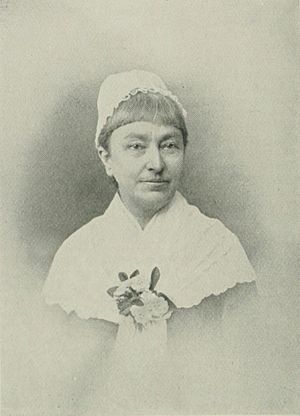Cornelia Collins Hussey facts for kids
Quick facts for kids
Cornelia Collins Hussey
|
|
|---|---|

"A Woman of the Century"
|
|
| Born | Cornelia Collins July 7, 1827 Manhattan, New York City, U.S. |
| Died | October 13, 1902 (aged 75) |
| Resting place | Milton, Ulster County, New York, U.S. |
| Occupation |
|
| Language | English |
| Nationality | American |
| Spouse |
William H. Hussey
(m. 1851) |
| Children | 3 |
| Relatives | Isaac Collins |
Cornelia Collins Hussey (born Collins; July 7, 1827 – October 13, 1902) was an American woman who lived in the 1800s. She was known for being a philanthropist, which means she gave a lot of money to good causes. She was also a suffragist, meaning she worked hard for women's right to vote, and a writer. Her generous financial help was very important to the New Jersey state association for women's rights.
Contents
Early Life and Beliefs
Cornelia Collins was born in New York City on July 7, 1827. Her family had been part of the Society of Friends, also known as Quakers, for many generations. Quakers are a religious group known for their peaceful beliefs and commitment to social justice.
From a young age, Cornelia was interested in the anti-slavery movement. This movement worked to end slavery in the United States. Even before she turned 21, she became a manager at the Colored Orphan Asylum in New York City. This was an orphanage for African American children.
Family and Medical Work
On April 16, 1851, Cornelia married William H. Hussey in New York. They had three children: Mary Dudley Hussey, Frederick Hussey, and George Benjamin Hussey. Their daughter, Mary, later became a doctor and also supported women's right to vote.
In 1853, Cornelia met Dr. Elizabeth Blackwell, who was the first woman to earn a medical degree in the United States. Dr. Blackwell started a special place where poor women could see a female doctor. Cornelia worked with Dr. Blackwell and others to create the New York Infirmary for Women and Children. This hospital aimed to give poor women medical care from other women. Later, a medical college for women grew out of this hospital. Cornelia's daughter, Mary, studied medicine there. Cornelia also gave money to the hospital to create a special bed for children, in memory of her father.
Fighting for Women's Rights
After her children grew up, Cornelia and her family moved to Orange, New Jersey. There, she became very active in the woman suffrage movement. This movement worked to get women the right to vote. She joined the executive committee of the American Woman Suffrage Association. Later, Susan B. Anthony, a famous leader in the suffrage movement, asked Cornelia to be the vice-president for New Jersey of the National Woman Suffrage Association. She held these important positions for many years.
Cornelia was also interested in social purity. In 1876, she became secretary of a committee that worked against laws that would have allowed certain immoral activities. She helped stop these laws from being passed.
She also supported Anna Ella Carroll, a woman who claimed to have helped plan an important military campaign during the American Civil War. Cornelia raised money for Anna Ella Carroll and helped her financially. She also wrote many articles for the Woman's Journal and other newspapers, sharing information about women's rights and other reform ideas.
Community Involvement and Generosity
Cornelia was a founding member of the Woman's Club of Orange. She was also a trustee for the New York Infirmary for Women and Children. She gave money to start the New Jersey Legal Aid Association, which helps people get legal help. She continued to be a manager at the Colored Orphan Asylum, even when it was not popular to support African Americans.
She helped start the American Purity Alliance and served as its secretary and vice-president. Cornelia often hosted important leaders like Lucy Stone, Susan B. Anthony, Anna Howard Shaw, and Carrie Chapman Catt at her home. She also gave money to the East Orange Flower Mission, which helped bring flowers to people in need.
Cornelia was an honorary member of the National Woman Suffrage Association. She had supported this cause for 33 years and left them $10,000 in her will. She gave generously to many charities in Orange.
She opened her private park to entertain groups like the "Little Mothers" from New York. These were young girls who had to care for their younger siblings. She also hosted kindergarten children and other poor children. Her home was a place for meetings of women doctors and lawyers, suffrage meetings, and peace meetings. She was a strong supporter of the Universal Peace Union, an organization that worked for peace. She even had a cottage built for her and her husband at the Peace Grove in Mystic, Connecticut, which she named "The William and Cornelia."
Death and Legacy
Cornelia Collins Hussey passed away on October 13, 1902, at the age of 75. She was buried in Milton-on-the Hudson.
At a convention for women's suffrage, Carrie Chapman Catt spoke about Cornelia's generosity. She said that Cornelia often sent money to the suffrage cause, saying she wanted to give part of what she earned to help women get the vote. Miss Blackwell added that Cornelia was a quiet woman who never sought fame. She believed her talent was making money, and she used it to support the cause. Cornelia and her daughter, Dr. Mary D. Hussey, sent out a lot of literature about equal suffrage. Cornelia also made sure the Woman's Journal was available in many college reading rooms. She was a loyal and generous supporter of the paper for 33 years.
Cornelia Collins Hussey left $10,000 to the National American Woman Suffrage Association, continuing her support even after her death.
 | Sharif Bey |
 | Hale Woodruff |
 | Richmond Barthé |
 | Purvis Young |

